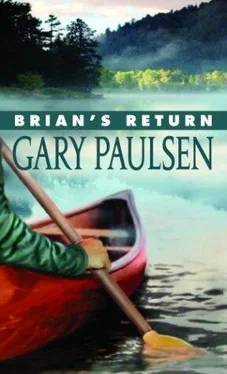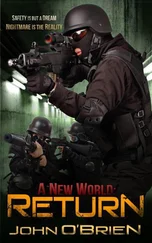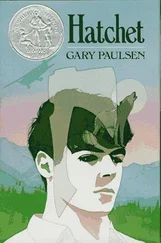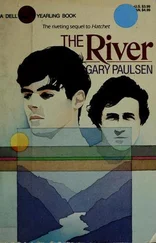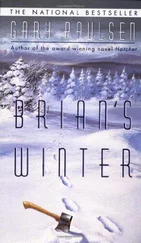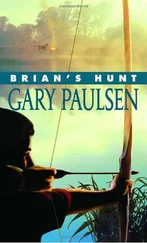Gary Paulsen - Brian's Return
Здесь есть возможность читать онлайн «Gary Paulsen - Brian's Return» весь текст электронной книги совершенно бесплатно (целиком полную версию без сокращений). В некоторых случаях можно слушать аудио, скачать через торрент в формате fb2 и присутствует краткое содержание. Год выпуска: 2001, ISBN: 2001, Жанр: Детские приключения, на английском языке. Описание произведения, (предисловие) а так же отзывы посетителей доступны на портале библиотеки ЛибКат.
- Название:Brian's Return
- Автор:
- Жанр:
- Год:2001
- ISBN:9780440413790
- Рейтинг книги:4 / 5. Голосов: 1
-
Избранное:Добавить в избранное
- Отзывы:
-
Ваша оценка:
- 80
- 1
- 2
- 3
- 4
- 5
Brian's Return: краткое содержание, описание и аннотация
Предлагаем к чтению аннотацию, описание, краткое содержание или предисловие (зависит от того, что написал сам автор книги «Brian's Return»). Если вы не нашли необходимую информацию о книге — напишите в комментариях, мы постараемся отыскать её.
Brian's Return — читать онлайн бесплатно полную книгу (весь текст) целиком
Ниже представлен текст книги, разбитый по страницам. Система сохранения места последней прочитанной страницы, позволяет с удобством читать онлайн бесплатно книгу «Brian's Return», без необходимости каждый раз заново искать на чём Вы остановились. Поставьте закладку, и сможете в любой момент перейти на страницу, на которой закончили чтение.
Интервал:
Закладка:
He gathered dry driftwood for half an hour and had plenty for the night. He started a fire and put the fish on one side of the fire and then he put one cup of water in the small pot with half a cup of rice and put it on the other side of the flames. He had not eaten since the night before and would get a full meal for tonight.
The fish boiled fast and was done in fifteen minutes. The rice took about half an hour. Brian picked the meat off the fish and put it in his metal cup until the rice was done; then he added the fish and some salt to the rice. He ate with a spoon, cleaned the pot well, then boiled water in the large pot to fill his two-quart canteen for the next day and furnish him with a cup of evening tea.
While the water was boiling he bearproofed the camp, or did the best he could. He had read up on bears when he was back in civilization and knew that above all they were intelligent and unpredictable. To be secure you had to get rid of all food smells. He buried the fish bones and skin well away from the camp area. He then tied the end of a piece of nylon rope to a stick to give it weight and lobbed it over a limb thirty feet up in a nearby birch. He tied both his packs to the line and pulled them up fifteen feet in the air, then snubbed the line off. A smart bear might know to chew the rope off and drop the packs, but he doubted there were many that intelligent around.
His sleeping bag was dry and he put it in the tent, then sat by the fire sipping hot tea with a sugar cube while he checked his bow. The string was well waxed and the water had not penetrated it. The bow itself was finished with a varnish that was waterproof. The arrows were a different story. They were made of bare wood — he hadn’t bothered to paint them or varnish the shafts — and the feathers had become soaked. He checked each shaft carefully to make certain it was still straight, found two that were slightly off and bent them gently until they were straight while holding them to the heat. All this knowledge came from books he’d read on old-time archery.
He then carefully held each arrow so that heat from the fire dried the feathers without curling them. It was a painstaking process, and he took his time, listening to the crackle of the fire, adding a stick or two now and then and becoming more and more aware of the night woods around him.
The forest was alive, for the woods became more active in the dark. Many predators were nocturnal— it was easier to catch prey then — though many prey animals like mice and rabbits moved in the dark because they felt safer.
Brian heard a hundred rustlings, rubbings, breaking of small twigs, brushing of hair against leaves. There, he thought, was a squirrel moving through trees, and there was a mouse or a rabbit moving over the forest floor — it was hard to tell them apart.
Suddenly he heard a scream, far off, as a rabbit was caught and died. It sounded almost human, babylike, very much like the sound a baby doll makes when it is tipped over. He heard it twice and then the rabbit was gone, into a wolf or fox or skunk or weasel, perhaps even an owl. Rabbits and mice were the bottom of the food chain in the woods — everybody ate them — and he heard screams twice more.
Three dead rabbits. As he held an arrow to the heat he let his mind play with the numbers. Three dead rabbits in an hour. He could probably only hear them scream from a couple of hundred yards — say a quarter of a square mile around him. Which meant that perhaps six rabbits an hour were killed in every square mile of wilderness at night and yet there were still hundreds, thousands of rabbits running loose, so many that in winter they left small highways packed so hard they would hold a human up on the snow.
He shook his head. Wasted thought. There were rabbits. They were good to eat. He had eaten many of them. He would eat many more. It was enough.
It was late and the moon was up. When he finished drying the arrows and quiver, he put the fire out and took his weapons and bow into the tent.
He was suffering a kind of jet lag, the shock of coming from civilization to the bush, and he was very tired. He crawled into his bag, arranged the knife and hatchet and bow and arrows near his head and leaned back and down to sleep.
It was a few minutes coming. He lay listening to the woods, thinking of the day. He hadn’t planned to camp here. On the map it was only a few miles to the next lake and he’d thought to go there before camping but the doe had come along and changed all his plans.
She had picked the campsite for him, he thought, smiling, as sleep came over him and he closed his eyes and let the day slip away.
Chapter TWELVE
Dear Caleb: Today I saw a place that was so beautiful that I don’t think even Shakespeare could describe it.
The map showed a series of small lakes covering perhaps thirty miles. In between, from lake to lake, there appeared to be a meandering river, all of it equally divided so that a lake might be three or four miles long, then the river to the next lake another three or four miles. But Brian was to find that the map wasn’t accurate.
He awakened just after dawn, when the sun began to warm the tent. The sky was cloudless. He flipped the canoe and when he went to lower his packs he saw the bear tracks.
One bear, medium size. It had come in the night so quietly that Brian hadn’t heard it — though he had slept so soundly the bear could have been tipping garbage cans.
It had done no damage. The tracks went by the fire, then moved to where he’d buried the fish leftovers. The bear had dug them up and eaten them. It had moved to the tent, apparently looked in on him, then gone to the packs. Brian could see that it had tried to stand and reach them. There were claw marks on the tree but the bear had never figured out the rope holding the packs and had gone off without doing anything destructive.
‘‘Company,’’ he said. ‘‘And I didn’t even wake up.’’
He slid the canoe into the water at the edge of the lake and loaded all his gear, again tying everything in. He took time to gather some bits of wood and leaves for a smudge in the can, then jumped in. It was still early but already warm and he quickly stripped down to shorts.
He kept the map in its clear plastic bag jammed beneath a rope in front of him. He knelt to paddle instead of sitting on the small seat because it felt more stable. He was not as confident in the canoe as he wished to be. He’d taken it to a small lake near home to practice and rented canoes in other places, but the ease with which the doe had flipped him made him very conscious of the fact that he had much to learn. By staying low and on his knees he had much more control.
He sat toward the rear with the load tied in slightly forward of the middle, which kept the canoe nearly level and easy to steer and control. He studied the map as he paddled.
He had only a mile to go in the present lake and then he would enter the river. He had the compass in one of the packs but didn’t truly need it. The lakes were well drawn on the map and he could see where the river flowed out.
Except that it wasn’t a river.
Brian worked easily to the end of the lake but when he came to the point where the river was supposed to flow out he found that there was no current. Instead of a series of different lakes connected by small rivers, the land was level and flat. It was all just one long lake and the very narrow portions that showed on the map as rivers really were long, tranquil ponds.
They were so narrow that the trees had grown together over them and Brian found himself paddling through a green wonderland.
The water was absolutely still beneath the trees. He could see his reflection ahead of him and off to the side, so distinct it was as if he were gliding over a mirror. And the water was clear. On both edges were lily pad forests and beneath them he could see where schools of panfish lay hidden. Inside of half an hour he saw a muskie that had to be thirty or forty pounds hunting the edges of the pads.
Читать дальшеИнтервал:
Закладка:
Похожие книги на «Brian's Return»
Представляем Вашему вниманию похожие книги на «Brian's Return» списком для выбора. Мы отобрали схожую по названию и смыслу литературу в надежде предоставить читателям больше вариантов отыскать новые, интересные, ещё непрочитанные произведения.
Обсуждение, отзывы о книге «Brian's Return» и просто собственные мнения читателей. Оставьте ваши комментарии, напишите, что Вы думаете о произведении, его смысле или главных героях. Укажите что конкретно понравилось, а что нет, и почему Вы так считаете.
